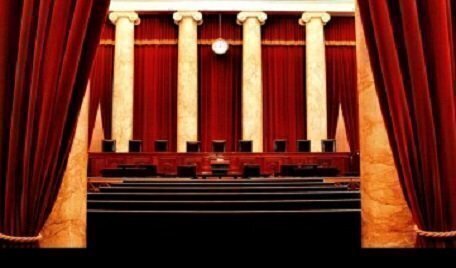With no Justice noting a dissent, the Supreme Court on Tuesday afternoon reinstated a federal judge’s fine of $50,000 a day on an unidentified company controlled by a foreign government for the company’s refusal to provide information in a U.S. criminal investigation. The probe may be related to Special Counsel Robert Mueller’s investigation of Russian interference in the 2016 presidential election.
 The deep mystery surrounding the foreign firm has been unfolding for several weeks, with few disclosures of just what and who is involved. After the Supreme Court acted on Tuesday afternoon, reporters for the Washington Post, citing unnamed sources, said the controversy does involve the Mueller investigation and that the firm involved is a financial institution.
The deep mystery surrounding the foreign firm has been unfolding for several weeks, with few disclosures of just what and who is involved. After the Supreme Court acted on Tuesday afternoon, reporters for the Washington Post, citing unnamed sources, said the controversy does involve the Mueller investigation and that the firm involved is a financial institution.
If those disclosures prove to be reliable, that would mean that the Supreme Court for the first time had sided with the Mueller investigation in a dispute over evidence of potential crimes, that the Mueller probe is reaching overseas, and that its investigation is following the trail of money.
Three developments on Tuesday brought the controversy somewhat more fully into public view:
First, the Supreme Court issued its brief order denying the foreign firm’s request to put on hold the lower court’s finding that it committed contempt of court for disobeying the grand jury subpoena. The practical effect was to start the running, again, of a $50,000 a day fine imposed for the contempt. The fine had been interrupted while the Justices considered the delay request.
Second, the Court disclosed that the foreign firm has now filed a formal appeal, asking the Justices to review a ruling last month by the U.S. Court of Appeals for the District of Columbia Circuit, which had upheld the contempt ruling and the escalating fine. This new filing was almost completely redacted, so the scope of the company’s objections to the Circuit Court ruling was not apparent. The fact that the Justices have now refused to delay the lower court ruling makes it less likely that the Supreme Court would now agree to hear the company’s actual appeal, although the case potentially raises several significant questions about the duty of foreign government entities to respond to criminal investigations in the U.S.
Finally, the Circuit Court issued a fuller opinion explaining its earlier decision against the foreign company. While key portions of that new opinion, too, were blacked-out, the opinion did reveal for the first time that the fine had been set at $50,000 a day, that the subpoena was served on a U.S. office of the foreign firm, that the firm does a substantial amount of business inside the U.S., that the company’s U.S. office claimed that it had none of the documents demanded by the grand jury in its possession (an indication that the grand jury is seeking data from the parent company overseas), and that the company has a legal duty to produce the information wherever it is located.
The practical effect of all of these developments is that the foreign firm – designated only as “Company A” in the parts of the papers made public – must now either furnish the requested information to the grand jury, or else seek to negotiate some kind of compromise that might spare it from the accumulating daily fine. At the rate of $50,000 a day for continued refusal to obey the subpoena, the contempt fine could reach a very substantial amount in a comparatively short period of time.
Because the Supreme Court treated what was before it with the utmost secrecy, because it grew out of secret grand-jury proceedings, there is no way for the public to know what “Company A” had said to the Justices to try to get the contempt ruling and fine delayed. One argument that it had to make, under normal procedures, was that there was a good chance that the Justices would later agree to rule on the validity of what the lower courts had done. The denial order implied that that point had not succeeded.







